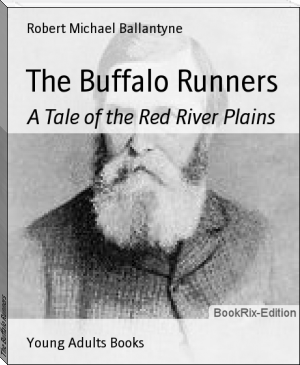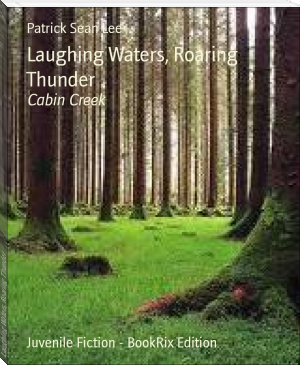The Buffalo Runners, Robert Michael Ballantyne [best fiction novels of all time .txt] 📗

- Author: Robert Michael Ballantyne
Book online «The Buffalo Runners, Robert Michael Ballantyne [best fiction novels of all time .txt] 📗». Author Robert Michael Ballantyne
"She's not fit to travel another mile," said Dan, stroking her glossy neck and allowing her to rub her nose affectionately on his shoulder.
"That iss true, whatever," assented Duncan. "I think we could not do better than camp on the nearest bluff."
This was agreed to by all. Provision for one meal, it will be remembered, had been prepared at Prairie Cottage in the morning. A hunter's meal, when properly divided, makes two or three average meals, and a hunter's powers of endurance are proverbial. Each man had his blanket strapped to his saddle. Branches of various kinds of trees make a good mattress, and the air of the prairie is well-known to conduce to appetite and slumber.
With such environment it is scarcely necessary to add that the hunters enjoyed themselves, and that Vixen had a restful night, probably without even a dream about hungry wolves.
CHAPTER EIGHT.
STIRRING EVENTS DESCRIBED.
The proverbial slip 'twixt the cup and the lip, and the well-known uncertainty of all human affairs, received striking illustration in the person and prospects of our hero, Daniel Davidson, not long after the events narrated in the last chapter.
Up to this period the unfortunate colonists of the Red River Settlement had led a life chiefly of disappointment and disaster. Although everything had been done for them by their patron the Earl of Selkirk with the best intentions, the carrying out of his plans had been frustrated by the feuds of the rival fur companies, the misunderstandings and the jealousies of Indians and half-breeds, and, to some extent, by the severity of the climate. An open rupture took place between them and the North-westers. Encounters between the contending parties occurred, in which several on both sides were killed, and at last the North-Westers, attacking the settlers in force, drove them from the colony and burnt their dwellings and homesteads.
Retreating to the north end of Lake Winnipeg, the colonists found refuge at Jack River--three hundred miles distant. From this place they were ultimately recalled by the Hudson's Bay Company, which took them under its protection. Returning to Red River, the unfortunate but persevering people proceeded to resume their farming operations. But the prospect before them was gloomy enough. The lawless proceedings of the rival companies had convulsed the whole Indian country, and the evil seemed to culminate in the Red River Colony, to which retired servants of the fur-traders, voyageurs, adventurers, and idlers gravitated as to a centre; so that there was little prospect of their being allowed to prosecute their agricultural operations in peace.
The dissensions at last became so great that a large proportion of the new settlers, including many of the Scotch Highlanders, dispersed to seek a precarious livelihood among the Indians, on the prairies bordering the waters of the Missouri, or to sustain themselves and their families by fishing in the distant lakes, and hunting on their shores.
On the advent of spring, however, most of these returned to the colony, with renewed hope in agriculture, and set to work--every man, woman, and child--to get some seed into the ground.
But at this point an event occurred which threw the colony into great consternation, and induced vigorous action on the part of Lord Selkirk, which was the first step towards more peaceful times.
The North-West party, consisting chiefly of half-breeds, had augmented to upwards of three hundred warriors. It would be more correct, perhaps, to style them banditti; for they had penetrated through every part of Rupert's Land, set law at defiance, pillaged and destroyed many of the establishments of their rivals, and kept the whole country in a state of ferment and alarm.
One band of these men, numbering between sixty and seventy, advanced upon Red River Colony. They were a motley crew, all mounted on horseback and armed with guns, spears, tomahawks, bows, and scalping-knives, besides which they were painted and plumed _a la sauvage_, and were in the habit when rushing to battle, of yelling like the Red-men whose blood mingled with that of the White-man in their veins.
What was the precise intention of these men at this time it is difficult to say, but it was not difficult to see that peace was not their object.
Governor Semple, of the Hudson's Bay Company, a mild, just, and much respected man, was in charge of the colony at the time.
Daniel Davidson was engaged in a very important conversation with old Duncan McKay at the time the formidable troop of North-Westers swept through the settlements. The old man was seated in the hall, parlour, drawing-room--or whatever you choose to call it--of Ben Nevis House. It was an uncarpeted, unpainted, unadorned room with pine plank flooring, plank walls, a plank ceiling, a plank table, and a set of plank chairs. Ornament was dispensed with in the hall of Ben Nevis House; for although Elspie would fain have clothed it with a little feminine grace, its proprietor would not hear of such proposals.
"Stick as many gimcracks as you like about your own room, Elspie," he had remarked when the first attempt was made, "but leave me my hall in peace. It iss quite pleased with it I am as it iss."
Opposite the door of the hall there was a large open fireplace without a grate. Doors all round the walls of the hall opened into the other rooms of the establishment. Above what would have been the mantelpiece, had one existed, there was a row of tobacco pipes. Old Duncan was a great smoker. Indeed he would have been almost unrecognisable without his pipe. He was smoking when Daniel Davidson visited him, in order to hold the very important conversation to which we have referred.
"It iss as you say, Taniel," remarked the old man, frowning at his pipe, which was not drawing properly. "Marrit life iss more to be desired than single blessedness, whatever, an' it is a my opeenion that you will do more work with Elspie helpin' you, than by yourself. When iss it you will be wantin' to call me your father?"
The old man asked the question with a somewhat humorous smile, for he was, to say truth, not a little proud of the staid, sensible, and strong young fellow who aspired to his daughter's hand--besides, the pipe was drawing well by that time.
"As soon as you like," answered Dan, "or, rather, as soon as Elspie likes. You see, things are beginning to look a little more hopeful now. People who seem to know best--or seem to think they do--tell us that the Nor'-Westers are beginning to see that a colony here won't interfere in any way with their business; a good deal of seed has been sown, and, if all goes well, we may look for a better year than we have yet had; therefore I don't see why we should wait any longer."
"Your observations are ferry true. There iss just wan little word you mention that requires consideration," returned the old man with a brow wrinkled so as to suggest profound sagacity of thought. "You said `if all goes well.' But supposin', for the sake of argument, that all does _not_ go well--what then?"
"Why, then," answered the young man with a laugh, "we shall be no worse off than other people, who have to make the best of things as they find them."
"No doubt--no doubt--that iss the true an' pheelosophical way to look at the matter. But don't you think, Taniel, that it would be as well to putt off till our munister arrives? I would not be havin' my daughter marrit without a munister if I can help it. An' you know his Lordship has promised more than wance to send us wan. He will not be long o' coming now."
"Yes, a minister has been promised again an' again," returned Dan, somewhat bitterly, "an' I suppose he will go on promising again and over again, but I have not much faith in these promises. The Earl has too many agents who are not as true as himself. I would rather not delay my marriage on that account. What ails you at Mr Sutherland?"
"Well, Taniel, I hev nothing to say against Muster Sutherland. He iss a ferry goot man--I will not be denyin' that, but--he iss not an ordained munister."
"What of that?" retorted Dan. "He is an ordained elder of the Church of Scotland, and that is much the same thing. And he is a good, Christian man, respected by every one in the Settlement."
"Well, well, Taniel; hev it your own way," returned old Duncan with a resigned look. "Of course, it would have been pleesanter if he had been a regular munister, whatever; but, as you say, my boy, `what of that?' So, as things look a little more peaceable than they wass--though not ferry much--I will be--"
He was interrupted at this point by the sudden entrance of Jacques Bourassin with the astounding intelligence that a band of North-Westers had gone up the Settlement to attack Fort Garry.
"Hoot! nonsense, man!" exclaimed old McKay, starting up and flinging his pipe away in the excitement of the moment.
"No--not nonsense!" said Bourassin in broken English; "it be true. I knows it. I come to say that we go to the fort to help them."
"Right, boy, right!" exclaimed the old man, hastily belting on his capote. "Fergus! Tuncan!--Elspie! where are these boys?"
"In the stable, father. I saw them just--"
"Let them saddle all the nags--quick," cried the old man. "Taniel, you better--"
He stopped; for Daniel had already run out to saddle and mount his own horse.
In a few minutes a cavalcade of a dozen powerful young fellows, headed by old Duncan McKay, and armed with guns, were galloping at full speed in the direction of Fort Garry.
But before this cavalcade had set out, the rencontre at the fort had already taken place, and been fatally decided.
The approach of the enemy had been announced to those nearest the scene of action by the women and children of that part of the Settlement, who were seen running about in frantic alarm trying to hide themselves, and some of them seeking refuge in the fort.
Among these were two brothers named Sinclair. One of them, Archie by name, was a stout healthy fellow of twelve or thereabouts, the other was a thin delicate boy of ten, whose illness, whatever it was, had reduced him to skin and bone, taken all the colour out of his cheeks, and rendered him quite unable to run or play like other boys. They had recently become orphans, their father and mother, who were among the most recent arrivals, having died suddenly within a few weeks of each other. When the alarm of the threatened attack was given, the brothers were amusing themselves on the sunny side of the cottage which had been for only one year their happy home.
In a moment Archie took his brother on his back and scampered away with him to a place near the river, and hid him in a hollow under the bank, where they had been wont to play at grizzly bears and hunters.
Meanwhile Governor Semple, with several gentlemen





Comments (0)